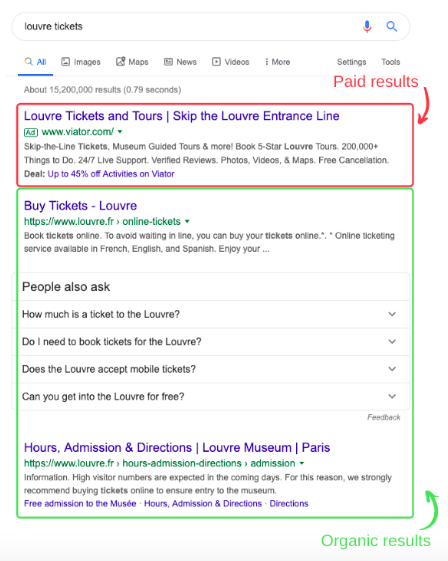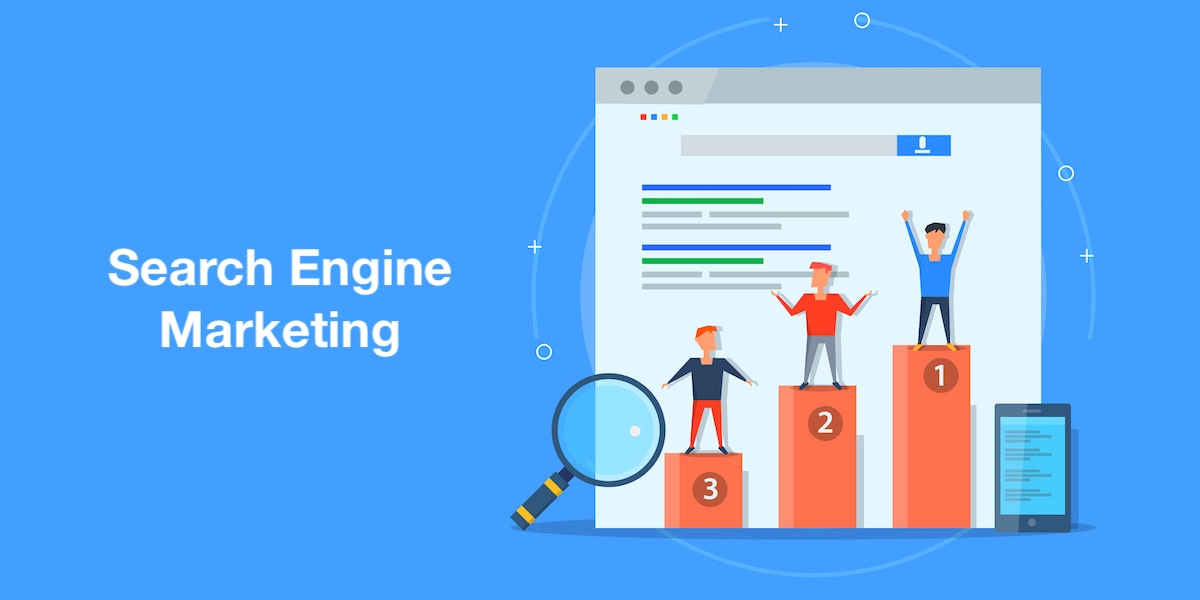Search Engine Marketing (SEM), is one of the most effective ways to grow your business in an increasingly competitive market. With millions of companies all competing for the same field. Online advertising has never been more important.
We can say that search engine marketing is the process of using paid strategies to increase search results. Brands pay for ads to appear as search results on search engine results pages.
Search engine marketing is the most effective way to promote your products and grow your business. SEM is also referred to as paid search or pay-per-click (PPC).

Why is search engine marketing important?
With more and more consumers searching for products and shopping online. Search engine marketing has become an important strategy for increasing a company’s reach.
In fact, the majority of new visitors find your website by doing a search on a search engine like (Google).
In search engine marketing, advertisers only pay for impressions that generate visitors. This makes it an effective way for a company to spend its marketing money.
As an added bonus, each visitor gradually improves the website’s ranking in organic search results.
Since consumers enter search terms with the intent of finding information of a commercial nature, they are in an excellent state of mind to make a purchase. Compared to other sites like social media where users are not explicitly searching for something.
Results are instant using search engine marketing. We can say that it is the fastest way to drive traffic to your website.
For Information,
Search Engine Optimization (SEO) and Search Engine Marketing (SEM) should be an essential part of your internet marketing strategy because the algorithms that power search engines are becoming more and more complex by the day. This means that a well-thought-out paid search advertising strategy has become an absolute must if you want to ensure high rankings in searches relevant to your business.
Tools like Advertising Research can help you monitor competitor ad copy and landing pages, allowing you to gain insight into how to improve your campaigns as well as what you can do to beat your competition.
In search engine marketing, advertisers pay for the impressions that result in visitors. Hence the name Pay Per Click. Search engine marketing aims to reach users when they need the information you have to provide.
Overall, a well-constructed search engine marketing strategy can boost your website’s SEO by attracting high-quality traffic. This proves to search engines like Google that your website is a reliable source, which in turn can boost your ranking.
How does search engine marketing work?
Search engines use complex algorithms to ensure that the most relevant results are returned for each search, including the location and other available information.
In paid search ads, sponsored ads appear on top and side of search engine results pages to gain more visibility and fame from organic results.
Let’s say you are a customer looking for a product or service online. You go to a search engine and type in your search terms (also known as keywords).
On your search results page, you will come across several company ads whose keywords match the keywords in your search.
These ads appear prominently on the page – along with other search listings that match your keywords. Paid listings are closely related to your specific search, which makes it more likely that you will click on them.
Let’s now look at how SEM campaigns work from a marketing perspective:
SEM networks are self-service operations. Once the marketer selects a network, he can start the campaign within a short period of time.
When setting up a campaign within the SEM network, the marketer is required to:
- To perform keyword research and identify a set of keywords related to their site or product.
- To specify a geographical location in which to display the advertisement.
- He must create a text ad to display in the search results.
- You bid on the price they are willing to pay for each click of their ad.
- It’s easy to produce text-only ads. Marketers enter a title, text for the ad content, a call to action, and a URL to
- take a specific action, whether it’s a purchase or just a piece of information.
Many consider search engine marketing to be the most effective way to spend marketing money.
Examples of search ad networks
The two primary search networks that search engine marketing professionals target are Google Ads (formerly Google Adwords) and Bing Ads.
Google AdWords is made up of two networks: the Google Search Network and the Google Display Network. The first network consists exclusively of search-related websites owned by Google, while the second network includes sites such as (YouTube, Blogger, and Gmail). Bing Ads allows customers to purchase ads on both the Yahoo network of websites and the Bing Network.
While Google AdWords is a much larger network (about 2x the size), the prices are often lower in Bing Ads. Marketers may be able to rank better for a competitive keyword phrase for less than they can get (Google). Some also reported higher click-through rates.
How to build an effective search engine marketing strategy
Creating effective SEO campaigns requires research and strategy before setting up your campaign, as well as after you launch it.
These are the steps for building an SEM strategy in a very clear way:
- Do a keyword research
- Select those keywords that are relevant to your business and have the right intent
- Open Google Ads and Create a Campaign
- Select the most relevant keywords
- Create an ad that will display in SERP search results
- Choose your bidding strategy and pay for every click you get
Search engine marketing allows you to place an ad in front of users who are in the right stage of the marketing funnel. In other words, customers who are willing to convert. But to make sure that your search marketing campaign will yield the highest ROI, you will need to target the right keywords, and also watch out for a few other things.
Now that you can confidently answer, “What is search engine marketing?”, start planning and implementing your SEM plan. Get started with the right tools to find the best keywords for your campaigns.

